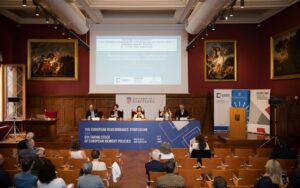What role did the aspirations for independence and the accompanying freedom slogans play in 20th-century European history? What did freedom mean in the last century and what does it mean today? How did both the struggle for freedom and its celebration become enshrined in our cultural and historical memory? These are the key questions that the participants of the 12th edition of the European Remembrance Symposium, entitled ‘Commemorating and narrating freedom’, will seek to answer. The event, which takes place in Warsaw from 21 to 24 May, will bring together over 200 representatives of memory institutions from around the world.

The main organiser of the European Remembrance Symposium is the European Network Remembrance and Solidarity, and this year’s edition of the event is co-organised with the Polish History Museum, the brand new seat of which has been quite recently opened in the Warsaw Citadel.
The idea of the symposium came from the conviction that a dialogue relating to the events of the last century is imperative, and needs to take into account different sensibilities, experiences and existing interpretations. The annual meeting aims to initiate and deepen cooperation between institutions and organisations dealing with the history and remembrance of 20th-century Europe, as well as with historical education.
This year’s symposium is dedicated to various narratives within the broader memory of freedom in Europe and around the world. Academics and practitioners from different countries will gather in Warsaw to examine the spaces of the newest and most popular history museums and memorial places. For decades, they have played a special role in the creation of a historical and cultural memory of various generations, both as sites that shape this memory and as institutions that engage visitors in the co-creation of narratives about the past.
Taking into account the dynamically changing technologies and increasingly advanced tools for visualising the past, so crucial to the popularisation of history and the educational process, participants of the symposium will explore the opportunities and threats introduced by artificial intelligence (AI), virtual reality (VR) and immersive media.
Here are some of the issues that will be discussed:
- Freedom in national and museum narratives concerning the past. How is it understood and in what contexts is it to be found?
- Historical education. Freedom and modern technologies – challenges and opportunities.
- Freedom and culture. How is the memory of freedom commemorated in contemporary public cultural discourse?
- Commercialisation of cultural institutions and museums. Engaging the public and audiences, and their positive as well as negative impact on museum narratives.
The four-day event includes panel discussions and a series of networking events. During Q&A sessions, speakers will share their experience of undertaking projects, while those taking part in ‘turbo presentations’ will have 90 seconds to present their institutions or encourage new partners. There will also be visits to museums and memorials in Warsaw, and cultural events.
The series of European Remembrance Symposia was inaugurated in Gdansk, Poland, in September 2012 and successive editions have been held in Berlin, Prague, Vienna, Budapest, Brussels, Bucharest, Paris, Tallinn, Dublin and Barcelona.
The event is organised by European Network Remembrance and Solidarity and Polish History Musuem.
A detailed programme of the event is available at: https://enrs.eu/edition/european-remembrance-symposium-2024.
The event will take place on 21 – 24 May 2024 on Warsaw.




